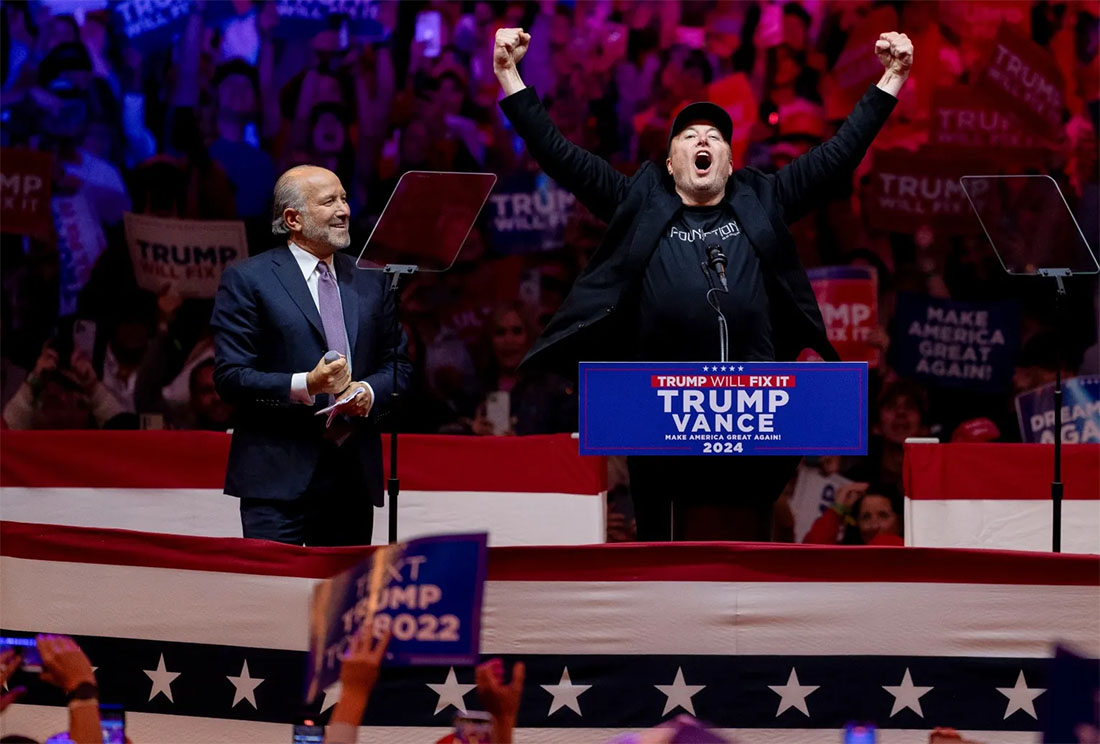
Photo Credit: Getty Images
Historically, and in stunning display of wealth and political power, Donald Trump’s second-term White House is unprecedentedly powerful as a consumer of Silicon Valley’s own elite. With the United States facing increasing economic disparity and a precipitous fall in faith in its institutions, the entrance of tech entrepreneurs into Washington D.C. is indicative of a fundamental change in America’s rulemaking.
In his last speech, President Joe Biden warned against the increasing oligarchy and the “gradual concentration of power among a small, ultra-wealthy group of very rich people. His worries are confirmed by the obscene sum of wealth represented in Trump’s brain trust, comprising at least 13 billionaires and a collective net worth over $7 billion. The presence of Elon Musk as the chief of the newly formed Department of Government Efficiency merely emphasizes the Silicon Valley takeover. This partnership between tech and politics represents a new frontier in corporate influence over public policy.
Biden’s analogy to Dwight Eisenhower’s 1961 warning of a “military-industrial complex” now shifts to what he termed the “tech-industrial complex.”. This industry has been in full swing since the beginning of this millennium, and the ranks of U.S. billionaires has increased from 60 in 1990 to almost 750 as of today. Interestingly, most of the centibillionaires in the country—that is, people with assets over $100 billion—are at the forefront of the tech sector, such as known tech tycoons, like Musk, Jeff Bezos, and Mark Zuckerberg. Their ascent has not only remade the economy, but also changed the face of political clout.
Trump administration appointments represent a trend line between Silicon Valley and government. [P]referred key appointees such as the venture capitalist, David Sacks, who will be “AI and crypto tsar”, and the re-emergence of Peter Thiel’s allies indicate, that there are still a lot of Initiatives underway to carry the ambitions of Silicon Valley—namely, to be as dominant as possible in Washington, the entry point to regulating all aspects of life. Whereas Wall Street once embodied the fusion point of private and public power, the cloud now occupies that same space, if not adds to it.
The policy Implications are vast. Tech megacenters plan to abolish antitrust rules (developed) by the Biden administration, win profitable federal procurement contracts, and permanently extend tax reduction (made) by the Trump administration in 2017. These moves will not only enrich corporate leaders but also redefine America’s regulatory landscape. Companies such as SpaceX and Palantir already possess significant influence via federal contracts, whereas Musk’s Starlink and Tesla can expect to accrue influence via trade agreements determined favorably to them.
A reimagining of governance itself. People, such as Thiel and Musk, have always been clamoring for getting out of the framework of national states. From Musk’s plans for Mars colonization to venture capitalist Balaji Srinivasan’s concept of “network states, the tech elite envision a world where they are less tethered to national boundaries and more aligned with global capital flows.
The biggest danger could not be classic authoritarianism but an a borderless and nihilistic capitalism that wants money and nothing else in return, nothing for humanity. The next four years will test the resilience of America’s democratic institutions in the face of this unprecedented convergence of wealth and power.
















